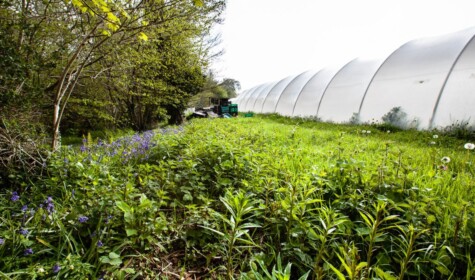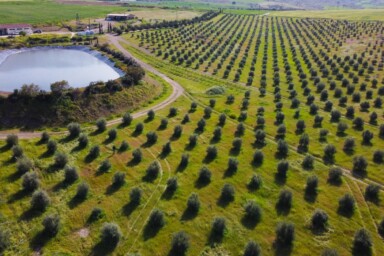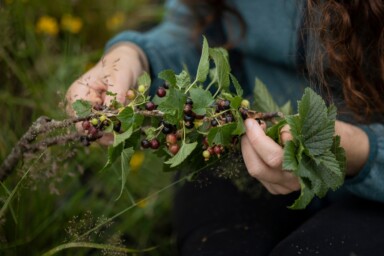COVID-19 really did feel as if it arrived in the UK like a tsunami – the rumble of trouble crossing the European continent a warning, but still some complacency that it had not yet fully broken into the UK; and then, within the span of a week, supermarkets were raided, schools closed, then restaurants and bars, then all shops but those offering essential services, then the lockdown on movement.
For my husband Nathan and I, as vegetable producers, the wake-up call was sharp. It’s not easy to make money growing vegetables in the best of times, but the growing uncertainty of what lies ahead is unnerving. As a mixed organic farm, we have many aspects to our business, a strategy that has proven valuable. The critical income from our two holiday lets which get going in spring has bolstered the farm through the difficult UK hungry gap for many years. But this year, all we’ve had are cancellations and the money which pays for us to buy seeds and compost and pay our employees isn’t there.
I think it began to dawn on me that we had truly arrived in our dystopian future when a friend from London asked whether there was any way that we could send them some veg (we’re in West Wales)? While this may have been wry commentary on the lack of produce on London supermarket shelves, it became clear what a desperate situation we were facing through the week as our phone began to ring and ring and ring with people wanting to join our box scheme. With supermarkets still reeling from the mass assault upon their shelves, many people had begun to recognise the obvious vulnerabilities of supermarket supply chains along with the danger of proximity to other people that supermarkets posed, especially to those most at-risk of the coronavirus – the over-70s and those with underlying conditions. A. H. Lewis’s phrase ‘Nine meals from anarchy’ has a terrible ring to it in today’s situation.
We did our usual market in Newport, Pembrokeshire on 16 March, with some trepidation, bagging all the veg in set amounts, instead of having it loose as we usually did; and while Nathan wore gloves, the exchange of cash still posed some concerns for customers, especially as money is made of plastic now and the coronavirus can live on it for up to three days. We were both aware of the impact on our business and on our customers, should one or both of us become sick. We decided that week that we wouldn’t do markets until the pandemic broke. Such a decision for us was deeply difficult – the market comprises nearly half our income and we have not missed a market for years now. We have a loyal following who turn up in all weathers, because they know we will be there. With our decision, other traders in the market followed suit.
Markets are for many local producers, their key sales. We do a market with a fabulous local cheese producer, Nick Holtham of Dolwerdd, who does a range of markets across Ceredigion and Pembrokeshire – Aberystwyth, Haverfordwest, St. Dogmaels along with Newport. Similarly, Anne and Peter Segger, fellow veg producers who run Blaencamel Farm, sell much of their produce through farmer’ markets. On 21 March, the Aberystwyth Farmers’ Market went ahead – but with local councillors watching carefully to see if customers were adhering to social distancing in order to protect public health.
Many markets, unlike supermarkets, have closed, even though they provide a vital product – healthy locally produced food including ‘real’ bread, artisan cheese, vegetables and meat. Some like Stroud Market have cleverly moved to a system where people can pre-order and pick-up at an allotted time, allowing for sales on the market while managing to keep both producers and customers safe. In the US, keeping farmers’ markets open is also an issue as they fight to be seen as essential services. They offer, arguably, safer environments for shopping than supermarkets, as the California Alliance of Farmers’ Markets points out, arguing that the short supply chains lessen contact between people, the markets are open air and there is space for social distancing, among other things.
The thirst for healthy local food that has erupted with COVID-19, was a surprise, I think, to many producers. It certainly was for us – we expected there would probably be increased interest in our boxes because we deliver, but the number of phone calls we got was quite eye-opening. In the first week, we doubled the numbers of boxes we were doing. We are now struggling to supply even more people as the demand continues, while the UK hungry gap bites and we try to sow seeds and get our new crops into the ground. The mental strain of this balancing act is exhausting.
Riverford and Abel & Cole, the two biggest box schemes in the country, are now both closed for new orders. Riverford’s Wicked Leeks column tells of how staff are doubling down, redeploying sales and marketing staff to customer service and with van drivers helping to pack boxes.
As the spring properly arrives, there will questions about where our farm workers are coming from. For us, it’s not so hard because we are small – our assistant grower lives next door and our two volunteers are now stuck with us for the foreseeable future. With large portions of Europe also in lockdown, travel to the UK is currently out of the question unless you are moving commercial goods.
Horticulture in the UK has not been given the attention that it deserves. Only 153,000 hectares of the UK’s total agricultural land (17.6 million hectares) is devoted to growing fruits and vegetables. The country’s self-sufficiency in fruit and vegetable production is in long-term decline – only 56% of vegetables and a mere 16% of fruits are grown in the UK. But perhaps things are about to change? Are there a few thin silver linings to the lock-down? People will inevitably have to cook more and as they cook, maybe they’ll think more about their vegetables? And if it’s hard to get vegetables, maybe they’ll think about what it takes to grow vegetables – some might even grow them, themselves? And maybe, they’ll remember that in the last great global crisis of World War II, that the nation made food production a priority.
While there are many lessons to learn from the experience of COVID-19, the value of self-sufficiency is clearly an important one but it’s not just an individual one, it’s a national one. The scramble for fresh veg that has been going on tells us one thing – if we want a healthy, well-fed nation, we need to invest in edible horticulture and grow far, far more than we do.
The Landworkers’ Alliance have sent a letter to Rt Hon Rishi Sunak and Rt Hon Victoria Prentis calling for an emergency package of support to protect our local food supply, and we need your support in signing this petition to put pressure on them to deliver at this key moment. Sign the petition here.






